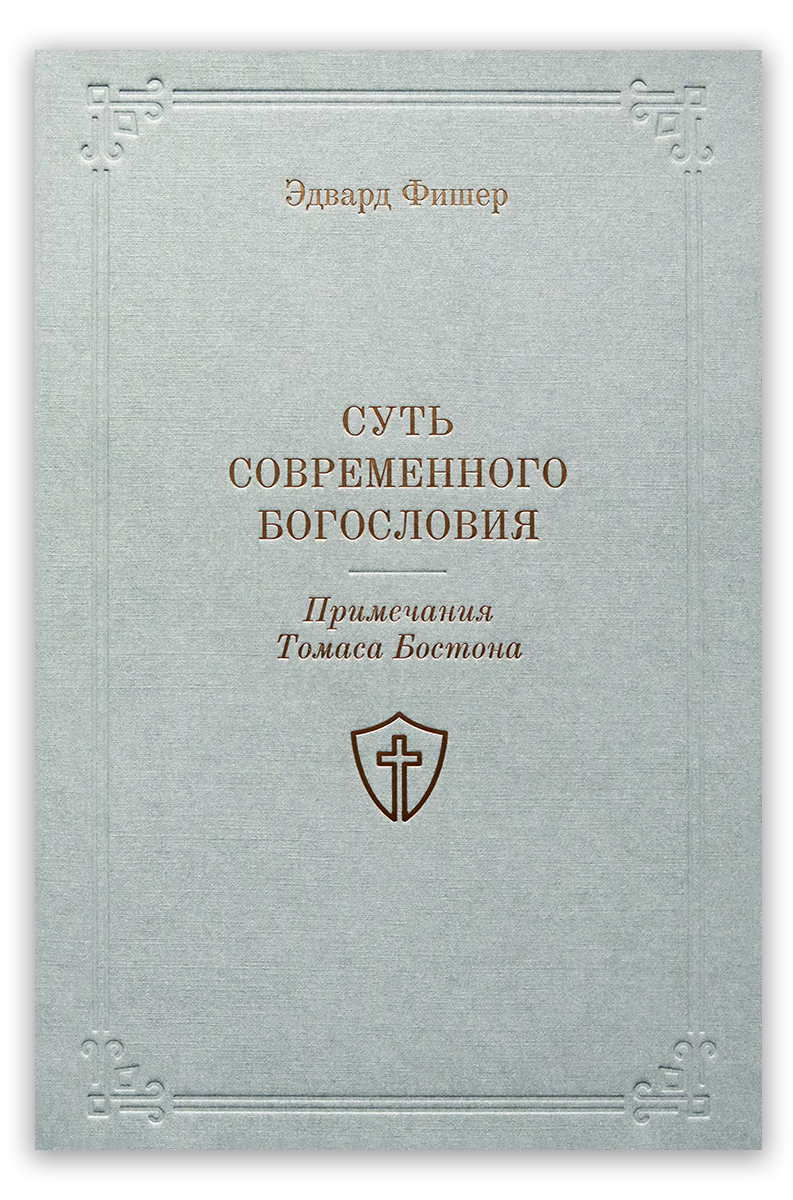
Edward Fisher (ca. 1627-1655) - English theologian and writer. Fisher was the eldest son of Sir Edward Fisher, Knight, of Mickleton, Gloucestershire. In 1627, he entered Braynose College in Oxford as a nobleman and received a bachelor's degree. He was noted for his knowledge of church history and classical languages. He died in Ireland, the exact date of his death is unknown.
-

The essence of modern theology
Author: Edward FisherCategoryDescriptionContentAuthorDetailsThe book "The Essence of Modern Theology" was written in the 1600s by an author about whom we know almost nothing. However, it turned out to be a critically important, albeit controversial, theological work. This book is written in the form of a dialogue between a priest (Evangelist), a young Christian (Neophyte), a lawyer (Nomist), who believes that Christianity is a set of rules that must be followed, and an Antinomist who believes that it is possible to sin because God will still forgive him. The book turned out to be surprisingly insightful and remains extremely relevant today. This edition includes explanatory notes by the famous Puritan Thomas Boston, an introduction by Philip Raiken, and a historical introduction by William Vandodewaard.
Read moreINTRODUCTION
Journey to the past: the history of "Essences of Modern Theology"
E. F. – who is he?
Two Fishers
Search in London
Closing the Edward Fisher case
Scotland and the "Essence"
"The essence of modern theology" in the XXI century
PART 1FOREWORD T. BOSTON
TO THE HONORABLE COLONEL JOHN DOWNS
TO READERS
INTRODUCTION
Disagreements regarding the law
Triple law
1. ABOUT THE LAW, OR THE TESTAMENT OF DEAL
The nature of the covenant of affairs
The Fall of Adam
The sinfulness and calamities of mankind due to the Fall
Restoration by means of the law or covenant of deeds is impossible
The covenant of deeds is binding, even though it was broken
2. O THE LAW OF FAITH, OR THE COVENANT OF GRACE
About the eternal plan of grace
About the promise
The promise given to Adam
Renewal of the promise to Abraham
Law as a covenant, added to the promise
Promises and covenant with Abraham, renewed with the Israelites
The covenant of grace in the age of Moses
A natural inclination to commit affairs
Rejection of antinomian faith
The evil of legalism
About the fulfillment of the promise
Fulfillment of the law by Christ instead of the elect
Believers are dead to the law as to the covenant of deeds
The foundation of faith in Christ
Evangelical repentance as a consequence of faith
Spiritual marriage with Jesus Christ
Refutation of the statement about justification before faith
Believers are freed from the prescriptive and condemning power of the covenant of deeds
3. ABOUT THE LAW OF CHRIST
The nature of the law of Christ
The Law of the Ten Commandments is a rule of life for believers
Answers to antinomian objections
The need for signs and signs of grace
Answers to antinomian objections
Holiness and good works are achieved only by faith
Servant fear and slavish hope are not the sources of a believer's true obedience
The effectiveness of faith for the holiness of the heart and life of a Christian
Application of ways of strengthening faith
The difference between the law of works and the law of Christ applies to six paradoxes
Application of this difference in practice
This distinction is a middle ground between legalism and antinomianism
How to gain confidence
Signs and evidence of true faith
How to return lost certificates
Signs and signs of union with Christ
4. O HAPPINESS OF THE HEART, OR PEACE OF THE SOUL
The human soul has no rest until it comes to God
How the soul cannot find peace in God
God in Christ is the only true peace for the human soul
Conclusion
PART 2TO THE HONORABLE JOHN WARNER, LORD MAYOR OF THE GREAT CITY OF LONDON
TO THE DEAR READER
INTRODUCTION
The First Commandment
The Second Commandment
The Third Commandment
The fourth commandment
The Fifth Commandment
The Sixth Commandment
The seventh commandment
The eighth commandment
The ninth commandment
The Tenth Commandment
Application of the law
THE DIFFERENCE BETWEEN THE LAW AND THE GOSPEL
APPENDIX. The reason for the dispute about "Essence"
Questions agreed by the commission of the General Assembly
Question 1. Are there any commandments in the Gospel that were not actually given before the Gospel was revealed?
Question 2. Isn't the believer now obliged by the authority of the Creator to show personal obedience to the moral law, although not for justification?
Question 3. Is the commandment, in which we find the promise of life and the threat of death, a covenant of deeds?
Question 4. Was the threat of hell added to the moral law before it took the form of the covenant of deeds?
Question 5. Only believers are free from the commanding power of the law as a covenant?
Question 6. Does the sinner receive all that is necessary for salvation at once upon justification?
Question 7. Does preaching about the need for a holy life to find eternal happiness threaten dangerous consequences for the doctrine of the gift of grace?
Question 8. Is the knowledge, faith, and conviction that Christ died for me, that He is my Savior, and that all His deeds and sufferings were done for me, a direct act of faith?
Question 9. What is the act of faith by means of which the sinner accepts Christ and His saving benefits?
Question 10. Is it possible to say that the revelation of God's will in the Word, which gives the basis for offering Christ to everyone and commands everyone to accept Him, is the gift of Christ offered by the Father to all mankind? Is this gift to all mankind realized through sovereign grace, and what is it - absolute or conditional?
Question 11. Is a similar division of the law, which is explained and applied in the "Essences" and which cannot be rejected without burying several evangelical truths, justified?
Question 12. Should hope for heaven and fear of hell be excluded from the motives of a believer's obedience? If not, how can the "Essence" be defended, which clearly excludes them, but allows for other motives?
BIBLIOGRAPHY
INDEX OF BIBLICAL QUOTATIONS
Edward Fisher (ca. 1627-1655) - English theologian and writer. Fisher was the eldest son of Sir Edward Fisher, Knight, of Mickleton, Gloucestershire. In 1627, he entered Braynose College in Oxford as a nobleman and received a bachelor's degree. He was noted for his knowledge of church history and classical languages. He died in Ireland, the exact date of his death is unknown.
Author Edward FisherVendor ЛевитISBN 978-617-8232-07-8Year 2024Cover SolidPages count 488Language RussianWeight 750 gSize 163 x 235 x 24QuantityPrice ₴650.00dThe essence of modern theology
Regular price ₴650.00 UAHRegular priceUnit price / per


















